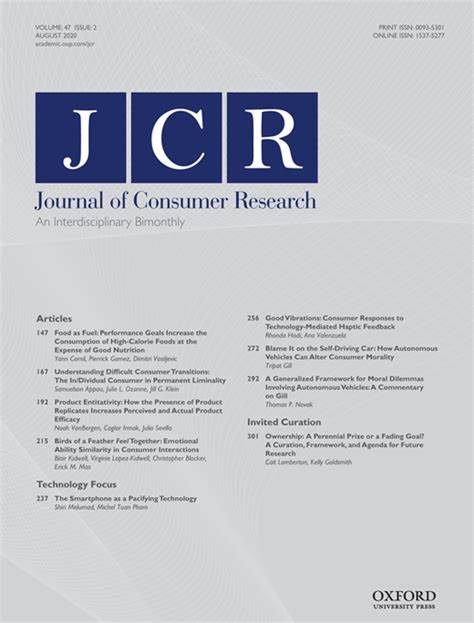Moving, Fast or Slow: How Perceived Speed Influences Mental Representation and Decision Making
IF 6.4
1区 管理学
Q1 BUSINESS
引用次数: 1
Abstract
Can the sensation of moving fast versus slow systematically influence consumer behavior? With recent technological innovations, people increasingly experience speed during decision making. They can be physically on the move with their devices or virtually immersed in speed simulated through their devices. Through seven experiments, we provide evidence for a speed-abstraction effect, where the perception of moving faster (vs. slower) leads people to rely on more abstract (vs. concrete) mental representations during decision making. This effect manifests for virtually simulated (experiment 1) and physically experienced (experiment 2) movement on moving trains. We suggest that it stems from an underlying speed-abstraction schema where people associate faster speed with abstraction and slower speed with concreteness (experiments 3a-3c). Weakening this schema attenuates the effect (experiment 4). Through a field study, experiment 5 demonstrates that video ads placed on Facebook are more engaging when virtually simulated speed matches the linguistic abstraction level of the message. Dimensions of psychological distance (time, space) and factors influencing mental representation (affect, fluency, spatial- orientation) are addressed as possible alternative explanations that cannot account for the effect. We propose a framework for understanding how experiencing speed—both physical and virtual—can influence decision making.移动,快或慢:感知速度如何影响心理表征和决策
快速移动与慢速移动的感觉会系统地影响消费者行为吗?随着最近的技术创新,人们在决策过程中越来越多地体验到速度。他们可以用自己的设备在身体上移动,也可以通过设备模拟速度。通过七个实验,我们为速度抽象效应提供了证据,即移动更快(相对于较慢)的感知导致人们在决策过程中依赖更抽象(相对于具体)的心理表征。这种影响表现在移动列车上的虚拟模拟(实验1)和物理体验(实验2)运动中。我们认为,它源于一种潜在的速度抽象模式,人们将更快的速度与抽象联系起来,将较慢的速度与具体联系起来(实验3a-3c)。弱化这种模式会减弱效果(实验4)。通过实地研究,实验5表明,当虚拟模拟的速度与消息的语言抽象水平相匹配时,Facebook上的视频广告更具吸引力。心理距离的维度(时间、空间)和影响心理表征的因素(情感、流利性、空间定向)被认为是可能的替代解释,无法解释这种影响。我们提出了一个框架来理解体验速度(物理和虚拟)如何影响决策。
本文章由计算机程序翻译,如有差异,请以英文原文为准。
求助全文
约1分钟内获得全文
求助全文
来源期刊

Journal of Consumer Research
BUSINESS-
CiteScore
12.00
自引率
9.70%
发文量
53
期刊介绍:
Journal of Consumer Research, established in 1974, is a reputable journal that publishes high-quality empirical, theoretical, and methodological papers on a wide range of consumer research topics. The primary objective of JCR is to contribute to the advancement of understanding consumer behavior and the practice of consumer research.
To be considered for publication in JCR, a paper must make a significant contribution to the existing body of knowledge in consumer research. It should aim to build upon, deepen, or challenge previous studies in the field of consumption, while providing both conceptual and empirical evidence to support its findings.
JCR prioritizes multidisciplinary perspectives, encouraging contributions from various disciplines, methodological approaches, theoretical frameworks, and substantive problem areas. The journal aims to cater to a diverse readership base by welcoming articles derived from different orientations and paradigms.
Overall, JCR is a valuable platform for scholars and researchers to share their work and contribute to the advancement of consumer research.
 求助内容:
求助内容: 应助结果提醒方式:
应助结果提醒方式:


